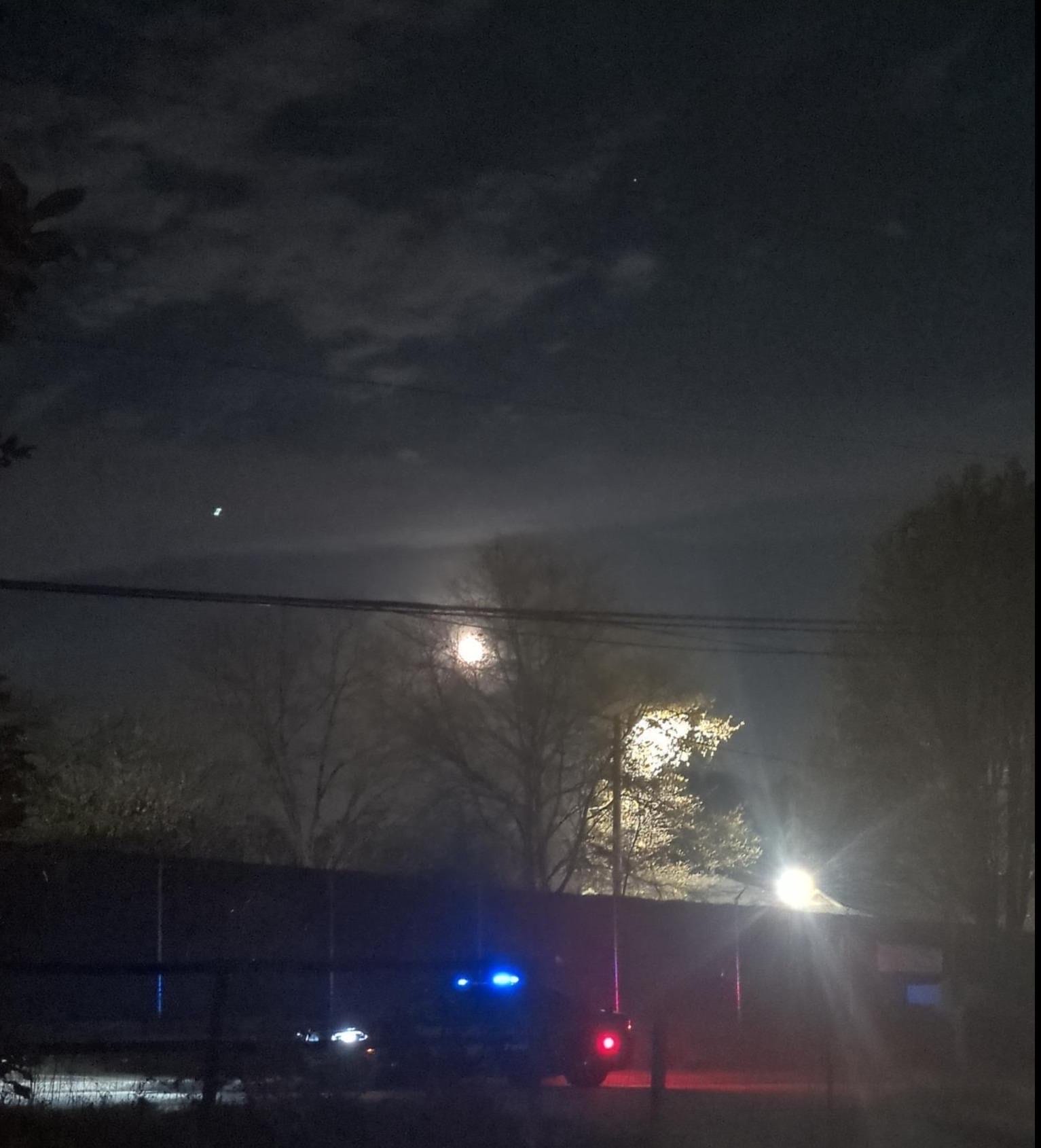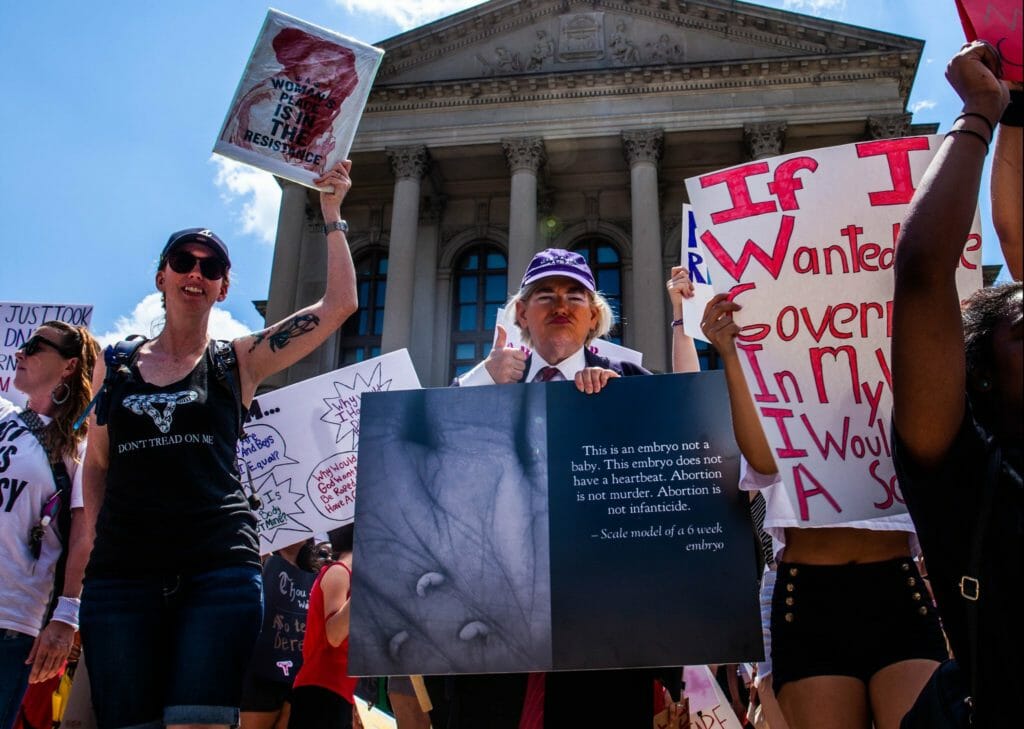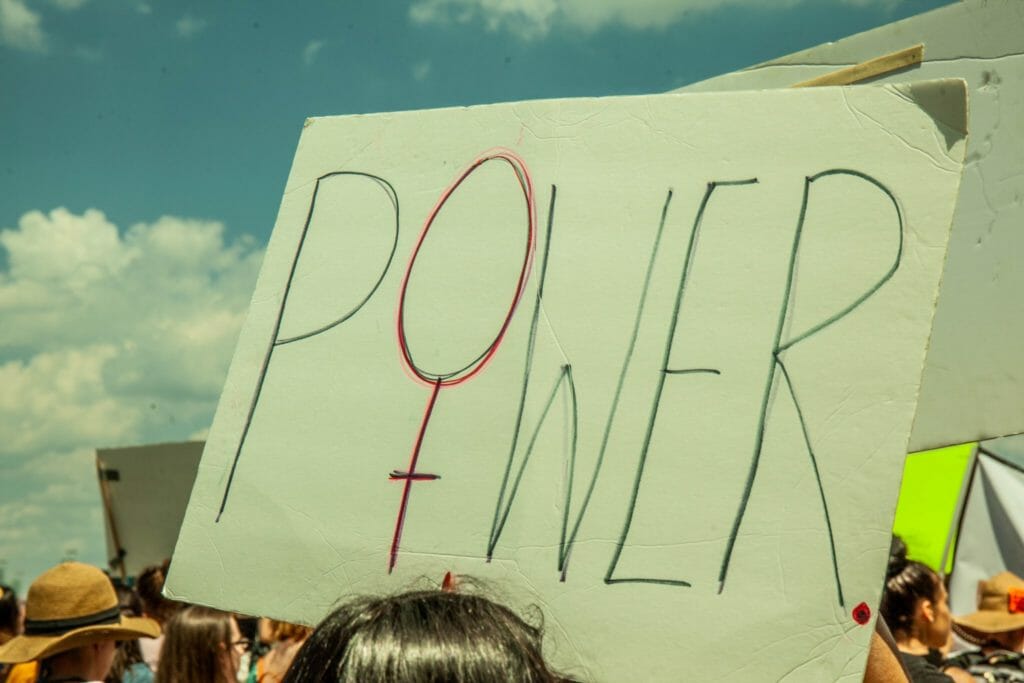Police harassment and surveillance has continued on the heels of the February raids, wherein multiple police agencies, including the FBI, raided three residential homes in South Atlanta
ATLANTA—Since the multi-agency raids that took place in South Atlanta last February, residents have reported that Atlanta Police Department (APD) officers are persistently surveilling homes in southwest Dekalb County and Lakewood Heights—sometimes up to five times per day at the same address. Numerous residents living in these neighborhoods near the “Cop City” construction site say the harassment appears to be targeted at those the police believe are opponents of the controversial construction project.
The police raided three homes in the area in a multi-agency operation between APD, ATF, the FBI, and GBI, detaining over 10 people and arresting one, Jack Mazurek, who was charged with first-degree arson. Another raid took place in Lakewood on Feb. 10, after police harassed one of the residents earlier in the day without a warrant or cause for arrest.
Over the past three months, Mainline has collected reports documenting dozens of incidents of police harassment and surveillance in the Lakewood area. After three years of uproarious local and nationwide protest against Cop City, the controversial $109 million police militarization facility continues to affect those most acutely who live near the proposed site.
Residents have described seeing police vehicles stationed outside of their home for extended periods of time, police knocking on their doors (sometimes for more than 10 minutes), and police following them near their homes. Three women told Mainline that, on multiple occasions, police had shined bright LED lights into their bedroom windows for around an hour, late at night. One report states that an officer sat outside a home wearing a full ski-mask-style face covering. Others say their vehicles have been followed by APD cars without cause when driving away from streets subject to surveillance.
“It is definitely unsettling to have police come to my door at all, knowing how they are harassing people and raiding peoples houses,” said one resident, who had previously been arrested at a Stop Cop City protest. (Their case was ultimately dismissed). “I feel sick and unable to focus on work.”

One resident reported to Mainline that he approached an Atlanta police vehicle after noticing officers parking near his home repeatedly for over a week. Rather than provide information, the officer ignored him and drove away when the resident approached to inquire about the visits. Several other residents reported similar incidents.
Another longtime Lakewood Heights resident, Margerie, asked Mainline to use a pseudonym for safety concerns. She described her experience in more detail:
“For more than three weeks, my neighbors and I noticed different police cars stationed outside our houses multiple times a day. We noticed cops at 2 a.m., midnight, 7 a.m. … all hours of the day. Most of the time when we’d head towards them to confront them, they’d peel out. I started sleeping with my curtains open, diagonal in bed, and was waking up all hours of the night, noticing their lights outside my window. They’d stop directly in front of me while I went to check the mail or do yard work. They’d slowly roll up and down the street while I spoke with my neighbors. [It was] intimidation in various forms. When I asked what we were supposed to think of this, one cop replied, ‘You should feel safe’.”
While the ongoing waves of home visits and harassment appear to go beyond APD’s regular patrol activities, some believe this is one example of a broader pattern of state repression towards burgeoning social justice and liberation movements. Lauren Regan, direct and senior staff attorney at Civil Liberties Defense Center, adds that these types of raids and harassment occur to simply create friction in movement spaces, rather than secure evidence for convictions.
“Historically in times of increased state repression, we will see police engage in punctuated moments of state violence–like a series of violent raids as we saw in February,” Regan explained in an interview with Mainline. “Often, the goal of such raids is not necessarily to collect evidence of a crime or to arrest the suspects of a crime. Instead, the state hits the hive and watches for the buzz—who freaks out, who burns all their journals and zine collections, etc. In the aftermath of these planned strikes, intel is sought by the state, particularly regarding movement mapping.”
Atlanta’s Legacy of Surveillance
Atlanta ranks as the most surveilled metro area in the U.S., a title which has recently been cemented by new city and county contracts with FLOCK, an Atlanta-based company that specializes in license plate reader technology. Further, civil liberties organizations across the U.S., such as the National Lawyers Guild, have denounced the continued and escalating police repression against Stop Cop City activists, who are experiencing unprecedented police surveillance.
In addition to public denouncement of the police’s tactics, many legal experts have casted doubt on whether or not these tactics are constitutional. Regan further explained to Mainline that the ongoing harassment in Lakewood, for example, is a violation of residents’ Fourth Amendment rights.
“Cops are not allowed to surveil or investigate lawful political activism,” Regan noted. “Cops parked in front of your house, cops stopping you and harassing you on the streets, spying into your home or personal life … those are all violations of your Fourth Amendment rights, unless they can articulate a legitimate reasonable belief that you have engaged in a crime, and not one of the made-up ones that Georgia is now infamous for like domestic terrorism for sleeping in a hammock.”
‘Cop City’ Activists’ Predictions Are Coming to Fruition
Activists have long expressed their concerns that decades of unchecked police abuse and violence by Atlanta police would only be exacerbated by Cop City. Dubbed a “playground for police” by locals, the project has garnered the most concentrated opposition in the east and south Atlanta communities that border the construction site, which was previously a beloved forest and public park.
Now, these communities say their fears and warnings are coming to fruition.
“It feels like all our concerns are being validated,” said a resident of the Starlight Heights neighborhood, who lives just a block from the forest. “We said the same thing for three years: that building Cop City would lead to greater police abuses, to more police harassment of local residents.”
Some recall the violent police killing of 26-year-old queer climate activist Manuel “Tortuguita” Paez Terán in January 2023 to be the tragic culmination of all the reasons why residents are fighting to stop the construction of the facility in the first place: to prevent further killings of people by police. (Terán was shot by police up to 14 times, leaving them with 57 bullet wounds, in the public park adjacent to the construction site of the facility.)
“We already have APD cars speeding through our neighborhood constantly since construction started,” the resident added, recalling the trends of police harassment towards activists against Cop City. “They already shot and killed Tortuguita in the park … Now they’re sitting on my street every single day.”
Resistance Persists
In the face of the ongoing heavy-handed repression, including the dragnet-style Racketeer Influenced and Corrupt Organizations (RICO) prosecution facing 61 protesters, many say they refuse to be intimidated. Despite the ongoing RICO trials, the escalated harassment in South Atlanta, and blocks to the “Cop City Vote” referendum, protests have continued in increasingly bold and creative ways.
Weekly street protests known as “Forest Fridays,” hosted by the Weelaunee Coalition, have continued outside the Cop City construction site entrances, despite numerous arrests. Additionally, several “lockdown” style blockades have disrupted Brasfield & Gorrie construction work in Atlanta with multiple activists’ bodies locked to machinery. (The Birmingham-based company is a donor to the Atlanta Police Foundation as well as the primary general contractor for both Cop City and the Shadowbox Studios expansion taking place in the forest.)
In late February, a nationwide summit to Stop Cop City convened in Tucson, Ariz., drawing over 300 participants for a series of protests, talks, and events. Numerous protests brought attention to Nationwide, the Arizona-based Cop City insurance provider. Meanwhile, in New York City, another 200 protestors entered and occupied a Nationwide office, unfurling banners that read “No Cop City” and “Profiteers of Homicide, Genocide, Ecocide. Drop the Contracts.”
In April, locals drew connections between Atlanta policing and Cop City to the Israeli military’s ongoing genocide in Gaza, as student protests took place on Emory University and other campuses in the global student protest movement, and Atlanta police drew scrutiny for their violent response to campus protests.
“The [police] behavior has been extremely stressful, but only further confirms why the Atlanta community is united against the Cop City project,” stated Anne, a Lakewood Heights resident who asked to use a pseudonym due to safety concerns. “We will continue to push against this unwarranted harassment, whether that’s in our backyards, in the halls of power, or wherever else injustice appears.”



